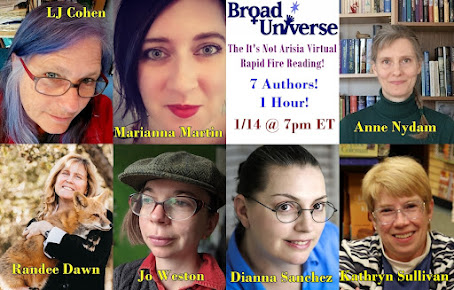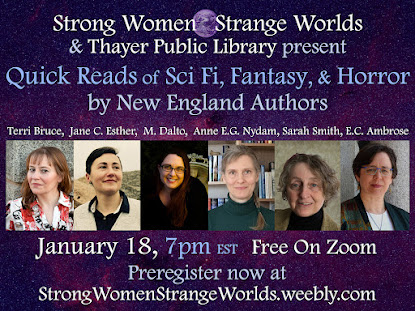It’s happening again: events that had been scheduled and planned and eagerly awaited are being cancelled due to the new covid surge. This is discouraging. (Yes, of course it’s not as discouraging as hospitalizations and death are, but still, it is certainly a disappointment.) Once again, however, we are trying to make do with on-line events, and I have two on-line author readings coming up in the next week. I will duly plug them because you, too, probably have need of some fabulous on-line events in these days of staying at home as much as possible. Today, however, I’ll also share a few thoughts about some of the considerations involved in selecting passages to read at author events.
• The first and least-negotiable factor is the time frame. Each event has its own requirements depending on its format and the number of authors. I’ve participated in readings that had to be under 4 minutes, all the way up to readings where I have 20 minutes to share. Both of my upcoming events are in the 7-8 minute range, which is roughly the equivalent of 4 pages from a book.
• The second decision is which book to read from. Sometimes this is determined by outside factors, such as the theme of the reading. For example, my event on January 18 has a New England theme, so I’m planning to read from the one of my books (The Extraordinary Book of Doors) that has scenes explicitly set in the Boston area. Or, for another example, when my bestiary was first released I featured it at all my readings because it was fresh and new.
• So I’ve decided which book I want to share, and I know how long a scene I get to share, and now I have to decide which scene. This is where it gets really knotty.
1. You want to pick a scene that gives an accurate idea of what the book is like. If your book is deep and tragic in tone, you probably don’t want to share the one scene that’s slapstick farce. Likewise, you want to share a scene featuring someone the book is really about, rather than a scene that focusses on a minor character that the reader will never see much more of. In other words, if someone goes on to read the rest of your book, they should feel that it was as your reading had represented it.
2. You want to pick a scene that the audience can drop into without too much confusion. It’s common to give a little intro to your reading, such as “In this scene Anneke the scullery maid has just discovered that her laundry basket is sentient, and now the two of them are hiding in a wardrobe and eavesdropping on a conversation between the evil Emperor Kolek and his chief advisor Rompollion.” Then you can start dropping names and the audience (hopefully) will have enough orientation to get the hang of things. However, there’s a limit to how much explanation you want to give, so it’s probably best to select a scene with only a few characters, and also one that doesn’t make too much reference to things that have happened earlier in the story. This ends up meaning that the scene you choose will almost always have to be from the first half of a book, because by the time you’re in the second half there’s usually already too much water under the bridge.
3. You want to pick a scene that stands on its own with at least a little bit of shape to it. It should have its own beginning, middle, and stopping place. Often it’s very effective if the stopping place is a dramatic mid-scene cliffhanger leaving the audience wanting more, but that doesn’t mean that you can just stop randomly whenever your allotted time runs out. You need to pick an ending place with an eye to effect, whether that’s the cliffhanger or the startling revelation or the note of satisfying closure.
• With all these considerations to juggle, it can actually be extremely difficult to pick the perfect scene for a reading, and for several of my books I have one excerpt that I think works the best… which makes it even harder when you add one more consideration: sometimes you have to pick a different scene because there may be audience overlap with a prior reading and you want to share something new and different every time.
For the New England reading I thought I’d share one of those Boston-area scenes… But after having read through my options a couple of times, I’m not sure that any of those particular scenes works very well with all the other considerations I’ve laid out above. Mostly they’re close to the end of the book and seem to require far too much background explanation. So, what will I be reading at these two upcoming events? I haven’t decided yet! But I can confidently assert that, my own dithering aside, they will be really enjoyable events, and if you like sci fi and/or fantasy, you should definitely join us on zoom!
Friday, January 14, 2022, 7:00pm (EST) - Broad Universe Not-Arisia Rapid Fire Reading: This is the reading that is taking place on zoom because Arisia, the convention at which it was originally scheduled to take place in person, was cancelled. So you won’t get chocolate thrown to the audience as often happens at Broad Universe Rapid Fire Readings, but you’ll still get to hear excerpts from all the amazing books.
Tuesday, January 18, 2022, 7:00pm (EST) - Strong Women-Strange Worlds and the Thayer Public Library of Braintree MA: This is a special edition of our QuickReads, featuring New England authors of sci fi and fantasy.



No comments:
Post a Comment